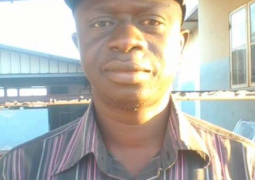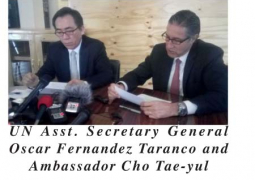
Please follow the interview in this question and answer format:
The Point: First of all can you please tell our readers who you are?
Consular: My name is Andy Utschig and I am the consular here at the US Embassy in Banjul. I have been in The Gambia for about ten months. I previously served first as a political and public diplomacy officer.
Two years before Gambia I was in Tokyo as the non-immigrant Visa chief. And I was there during the earthquark and tsunami.
The Point: There is a rumor going on in town that you rejects almost every applicant. How true is that?
Consular: Well, in 2011, we issued 1842 visas. Yesterday, we printed 26 Visas. Generally we go on issuing Visas every day as I say that is what we are here for to issue Visas to qualified travelers.
It’s true that the refusal rate has gone up. Unfortunately, we did a number of studies last year (four studies) and in each case we found more people over staying their visas than we would like to see. For instance student Visas, 3 out of every 10 students Visa applicants who were issued visas never show up at school. The goal is to have over stay rate around 3% but when is 30 % is ten times too high.
So, unfortunately when people overstayed and misused their visas they make it more difficult for legitimate travelers to get visas because we have to tighten and screen up every application carefully. That is what we are doing but we still look forward to saying yes.
The Point: Why do you normally reject applicants?
Consular: Actually there are four different categories that can lead to a person not getting a visa. The first category is ties. There are two kinds of ties that are important i.e social ties and financial ties.
When we talk about financial ties we are generally talking about salaries, bank account and may be real estate holding. And that can be difficult to overcome because some one may be earning an excellent salary by Gambian standard for example six thousand dalasis per month but still in the United States that will be a salary well below most minimum wage jobs. So, this makes it difficult to qualify in financial ties it is not impossible that a person can still qualify. But there is going to be an interview to show other financial resources.
When we talk about social ties we are talking about things like your family, your position in society and job. For instance some one who has been working for 10 years and have three teenage children has lot more reason to come back to The Gambia to their job.
The second broad category of things is credibility. Unfortunately, we have seen a number of applicants whose information doesn’t match.
For example, they may have a letter from their sponsor that they are going to visit Disney Wall and during their interview they say they have no plans to visit Disney Wall. This raises question about their application.
The third category of things that people often don’t realise some times people do apply for the wrong type of visa. For instance you are going for a two-week training course in US generally you are still going to need a students visa but a lot of people apply for a tourist visa instead.
The forth category is not common here is about those who have criminal record or other things in their background can often have a trouble in getting a visa. For example if you over stayed your Visa in the past or broken US Visa law in the past it can be very difficult to get a visa.
The Point: How do you feel rejecting people after they have paid a lot of money and going through this tedious process?
Consular: It’s very frustrating for us. We prefer to say yes that is more fun for the applicant that is more fun for us. And every day we look forward to saying yes to legitimate travelers. That is why we are here but US Law requires us to say no when the applicant isn’t qualified. So, we do have to say no we take satisfaction for the fact that we are upholding the law. It is not really my job to say yes or no but is my job to apply the law.
The Point: Do you have experience of some applicants bring to you false documents just to support their case?
Consular: Unfortunately yes we do see a lot of false documents. And bringing false documents to the embassy isn’t really a very good idea. We do check them and if we think a document is false we will sent it to the institution that should have made it and ask them. For example if you bring a bank statement we feel is fake we will contact the bank concern and if we get a university transcript that does not look like we send it to the university. If the bank or the university said yes is a fake them we share the information with the police.
So brining a fake document to the embassy can have two consequences; 1. You will be denied a visa of course and you will have trouble of getting a Visa in future.2. You may be arrested.
The Point: Can some one secure a Visa for another person without him or her appearing before you in person?
Consular: No, it cannot work. This is a common misconception that people have. Each applicant must qualify on his or her own. No one else can qualify for you. And in fact we have strict rules if I know the applicant generally, I cant interview that applicant someone else has to do that. We got a lot of applicants who when married and denied Visa say but I gave you all my uncle’s bank statements and estate holdings and all of my uncle’s paper, he has to pay for every thing. That may be so and having all those papers with your application can help but the applicant must still qualify on his or her own. We are not looking at the uncle’s social or financial ties it’s the applicant’s social and economic ties that matters.
The Point: That means, so one cannot secure a Visa for someone?
Consular: That is correct.
The Point: Dont you think it’s good to refund part of applicant’s money when they are rejected?
Consular: Well according to US Law we are required to charge an application fee in order to fund the ability to give Visas. In order to have this office here, we must charge an application fee to be able to do that. If we don’t charge application fee, we would not be able to issue any Visas that is the way it works. So, we are following the law in charging the application fee. This is reviewed regularly. Every two years we check how much does it cost to provide Visa services and we adjust the Visa fee in order to fund that.
The Point: I had the opportunity to travel to the US last year where I came across a lot of African nationals but few Gambians. Don’t you think this is because Gambians find it difficult to secure US Visas?
Consular: That is a good question. I think probably it has more to do with the size of the Gambian population compare to other African countries. But there are a very large active vibrant Gambian community in places like Atlanta, Maryland and Seattle. So, I think there is a lot of Gambians in United States there is also a lot of Gambian Americans. We got over 1000 Gambian American citizens living here in The Gambia. So, I think they are there but you have to get to places where they are concentrated.
The Point: Is it true that you are interviewing applicants within seconds?
Consular: Well, before we interview an applicant each application have to be examine by at least two people. So, by the time the applicant come to the window, we do have a very good idea of what short of application it is. Sometime the questions are for confirmation and its true that the more qualified you are or the less qualified you are the shorter your interview will be, and is the people who are in the middle whose interview take longer.
The Point: How busy is your section?
Consular: We are very busy. This section is rated 1.5 times the staff we have but we enjoy being busy that gives us pleasure in the work.
The Point: Do you have experience of applicants trying to bribe you in order for them to secure Visas?
Consular: Unfortunately there is a lot of fraud in the environment and we take that very seriously. So each time we have an allegation of fraud or someone make an offer like that we communicate that to Washington and goes into the records.
The Point: Can someone reapply for Visas and if so how long should it take?
Consular: Yes they can reapply as soon as they wish. However, we generally encourage people to wait until there has been some change in their circumstances. The more time in your job, a major life change, had children; get promotion, etc is going to be difficult for you to be rejected. Sometimes we do make mistakes and we recognize that and we do want to correct them. But generally if you come back the first question we are going to ask you will be; have there been any changes in your circumstances since you last time.
The Point: Finally you have any thing else that you would like to share with our readers?
Consular: Gambian American citizens whose passports are expired should go ahead and apply well before their travel. I want to encourage them to renew their passports before they expire as it takes few weeks before their passports will be ready.
The Point: Thanks for granting us the interview.
Consular: It’s my pleasure.



